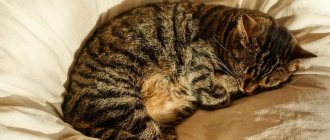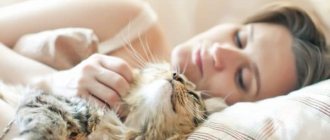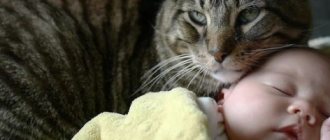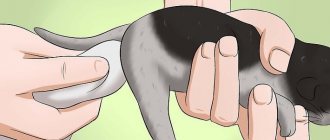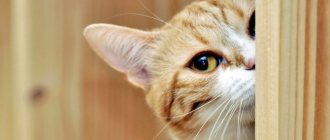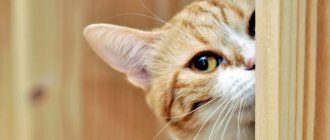The reasons why a cat keeps you awake at night can be varied. However, if nighttime behavior, excessive activity and loud cries become a regular occurrence, the owner should determine what is wrong with his pet as soon as possible. If everything is fine with your health and the fault is the wrong daily routine, you can wean your cat from running at night, following the advice suggested by experts.
Reasons why a cat is awake at night
The pet's activity manifests itself closer to night because it is a predator, albeit a domestic one. His wild ancestors hunted at night. He continued this habit.
Other explanations for nocturnal activity include:
- Demand for food because the owner did not feed the ward enough in the evening. He meows from hunger, trying to get him to give him food.
- Need for communication. He was alone in the house or apartment all day while people were working, and hopes to get attention from them, at least at night.
- Health problems that bother your pet, forcing you to meow.
- The ward slept during the day when no one disturbed him.
What can interfere with sleep
The neighbor's dog howls at night: what to do, what to do
There are other reasons why an animal behaves this way.
- A cat most often does not allow its owners to sleep due to boredom. The reason may be the pet’s insufficient activity during the day, then it is in the evening that he begins to be awake, wants to play, and thereby prevents him from sleeping peacefully. A cat can jump on its owner while sleeping, and the owner, while asleep, will experience shock. The pet does all this not out of malice, he’s just bored, and has more than enough unspent energy. He needs somewhere to put his energy, especially before the age of 3. You need to play with him a lot, you can buy different balls, balls, lures on sticks and make him play even when he wants to sleep during the day. At least 1.5-2 hours of such frantic activity for young ones and up to an hour for adults, and at night both the cat and the owner will sleep soundly. It is clear that he may not sleep the whole night, then it is important to let the pet know where it is possible to make noise. For example, hiss at him when he starts to get active in the bedroom.
- When a pet is alone in the house all day, he needs attention and communication, he becomes bored, since entertaining himself is not always fun. Therefore, when the owner of the house, at night, the animal believes that this is just the time to pay attention to it and play. It begins to interfere with sleep, sometimes it can even scratch and bite its owner.
- Often the cause of insomnia in cats can be fear or fear of something. For example, a cat sleeps and wakes up from any rustle, this means that it is tense and afraid of something, so it is always on the alert. In such a situation, she will not fall asleep until everyone is asleep. Cats can even be afraid of their owners if they hit her or swing at her. They are very touchy and can be under constant stress because of this. You need to treat the animal kindly.
- Another cause of fear is electrical appliances, for example, a pet saw a vacuum cleaner, hair dryer or mixer at night. He immediately becomes furious and can start meowing and jumping. In this case, you should try not to leave these devices in a place visible to the cat, so as not to provoke him.
- Pets are also very afraid of water, so when their fur gets wet, it loses its warming functions, then the pet walks around the house for a long time, trying to warm up. So it’s better to bathe your cat during the day so that this doesn’t happen at night.
- Waking at night often occurs due to unfulfilled sexual instinct. This means that the cat needs to be sterilized or taken to a cat.
- If the pet is very timid and often hides in a corner when guests come, then at night it tries to regain the attention of its owners and tries in every possible way to attract it.
Remove sources of temptation
Cats like to climb to heights. When the owner is sleeping, the animal can jump from a high place directly onto a sleeping person. To avoid such a situation, eliminate all dangerous places where your pet lives: shelves, cabinets that you can climb on and then jump down. Move dangerous furniture away from your sleeping area. You can put things on top of them that are difficult to jump on and drop.
The measures taken will help wean the cat from performing acrobatic tricks at inopportune times.
Serious reasons why a cat eats poorly and sleeps a lot and is lethargic
However, such a condition may also indicate a serious illness.
Worms
Associated symptoms:
- depressed state for several days;
- a sharp decrease in appetite or its complete absence;
- weight loss;
- disturbances in the functioning of the gastrointestinal tract (constipation, diarrhea, vomiting, flatulence, rumbling);
A swollen belly in kittens may be due to worms
- the coat is dull and crawling;
- swollen, barrel-shaped belly;
- dry crusts in the corners of the eyes without signs of inflammation;
- detection of traces of blood, fragments or whole worms in feces.
Important! If this disease is detected, your pet should be given an anthelmintic drug, the dosage of which is calculated according to the instructions.
Ticks
The bite of this external parasite can provoke piroplasmosis, the causative agent of which, entering the blood along with the saliva of the tick, spreads through the circulatory system in a matter of days and colonizes red blood cells. Its main goal is to weaken the immune system and disrupt the functioning of internal organs. If left untreated, such a bite can be fatal for the cat.
A burrowing tick can spread infection
If the cat is lethargic, sleeps all the time and eats little, has loose stools, vomiting, red urine and fever, you need to urgently examine it for a tick. The detected parasite must be removed, it is better if this is done by a doctor, because along with the tick’s saliva, the poisons and infection contained in it enter the cat’s body. But it is not always possible to quickly go to the clinic. In this case, you will have to remove the tick yourself using tweezers, a thin strong thread or another tool that can tightly grasp the body of the parasite. It is important to grab the bloodsucker as close to the cat's skin as possible and then carefully twist it clockwise.
For your information! A sharp jerk can tear off the body of the tick, and the head, remaining under the skin, will continue to spread the infection. Sometimes, when extracted, small head parts of the parasite remain under the skin, this is not scary, the cat’s immune system can handle it.
After removal, it is recommended to place the tick in a glass jar with alcohol or vodka; in such an environment, the tenacious parasite will die. And if you suspect infection with encephalitis or Lyme, you must deliver the parasite preserved in alcohol to the clinic for examination.
Poisoning
The cat does not eat well and sleeps constantly in case of poisoning, the causes of which may be stale food, household chemicals, medications, rodent poisons or secreted by house plants, etc. Frequent companions are severe chills, difficulty noisy breathing, lack of appetite, digestive tract upset (diarrhea, vomiting), increased salivation. In addition, there is a change in the color of the mucous membranes (reddened, blue or pale) and an increase/decrease in body temperature.
After poisoning, a cat lies a lot and moves little
Intestinal obstruction
This occurs due to the ingestion of small objects, the inability to regurgitate a large hairball, helminthic infestations, volvulus, or the consequences of gastrointestinal diseases.
Note! Owners often confuse obstruction with constipation, trying to eliminate the problem with a laxative, which causes greater damage to the pet’s health.
Pronounced symptoms of obstruction:
- a lethargic and apathetic state, a desire to hide from people and animals, in some cases loud meowing, obsessive following of the owner and attempts to pay attention to the stomach;
- a gradual decrease in appetite until a complete refusal to eat, food intake is accompanied by subsequent vomiting;
- prolonged absence of feces in the tray;
- aggression when trying to touch a swollen abdomen;
- Trying to get rid of gas, the cat rolls on the floor and carefully licks its stomach.
The cat is rolling on the floor due to intestinal obstruction
Asthma
With such a disease, the cat quickly gets tired and does not have the strength to play its usual games. She breathes with difficulty, often and shallowly, whistling sounds emerge in her breathing. The usual posture for an asthmatic is a hunched back, with the neck very elongated in a sitting position. As the disease progresses, apathy and drowsiness increase. If you notice the first signs, you should urgently visit a veterinarian.
You can't help but notice your cat's asthma by its noisy breathing.
Urolithiasis
The first symptom of such a disease is frequent, prolonged and painful urination in the wrong place, which at first the owner may mistake for the pet’s misconduct. The painfulness of the process and resentment for undeserved punishment provoke a change in behavior - the cat becomes sad, phlegmatic and drooping.
As the disease progresses, the pet runs to the toilet more and more often, in most cases not reaching the litter tray, since it can no longer restrain the urge, rapidly loses weight, and more and more blood enters the urine. If you notice an increase in urination and traces of blood in the urine, you should urgently seek help from a veterinarian to prevent the development of an advanced form of the disease and the manifestation of severe symptoms.
Urination posture for urolithiasis
Give your cat plenty of exercise
To keep your pet awake during the day, you need to play with him and take him for walks. You can use toys that imitate the movement of living insects or birds, balls, light bunnies, and pendulum objects.
You need to play with the cat longer until he gets tired. You can “walk” the cat outside before going to bed. Domestic cats rarely run far from home; it is unlikely that they will be lost if their owners are attentive.
Enforcement measures
What to do if the owners get a very active pet, capable of running and playing around the clock. The environment before bed should be quiet and calm. Avoid nighttime meals for all family members. Be patient and do not give in to manipulation. If the pet does not agree with the ban on sleeping on the owner’s bed, he will persistently try to get into the bedroom. It is important to prevent this from happening. To distract attention, you can place a scratching post near the door. If the animal does sneak into the room, you can try to darken it. In complete darkness, the cat will most likely quickly calm down and go to sleep.
The nightly activity of pets, which annoys their owners, is often the main reason why they are thrown out into the street or sent to a shelter. This is an absolutely wrong and inhumane decision, so before purchasing a cat, you need to carefully weigh the pros and cons of this decision. Well, if the “for” still outweighs, be patient and try to find a common language with your pet.
Determine the cat's territory
Set up your cat's sleeping place. You can organize a secluded corner for him in a box, or better yet, build several places where he can retire.
Do not train your animal to sleep with you. Feline individuals must know the boundaries of their territory. It is better to close the door to your own bedroom at night. If the cat is immediately accustomed to this order, he will not ask to sleep with the owner or mistress, meowing at the door.
The reasons for the restless meowing of cats at night can be found here:
Calming drops for cats during heat
cat Baiyun
The drug Kot Bayun is available in tablets and liquid form, which has a yellow-brown color. The liquid solution in veterinary medicine is found in glass bottles with hermetically sealed aluminum caps.
Compound
Motherwort, valerian, sweet clover, catnip, hawthorn, meadowsweet, peony, cudweed, hops, hodgepodge, oregano, thyme, St. John's wort, lemon balm, mint, meadowsweet, nettle, motherwort, sterile water, various vitamins and biological additives.
Indications for use
It brings the nervous system into proper tone, acts as a pain reliever, strengthens the immune system, eliminates anxiety and fear and is an excellent sedative.
Instructions for use and dosage of Kota Bayun for cats
Prescribed after ten months of age, 2 ml. 3-4 times a day, 20 minutes before meals or an hour after. Place the drops into the mouth or dilute them and give them with water. Shake before use.
Bach drops
These drops are developed on a natural basis and do not contain chemical additives. Made according to the method of the English physician Bach, who used in his practice the essences of the herbs included in this preparation. No negative reactions were observed in cats after their use. They are convenient because the bottles are available in different dosages: 7, 10, 20 and 30 ml; and a faceted lid with a nozzle.
Compound
Alcohol – 27% (or glycerin with water), clematis, ornithischium umbelliferum, plum splayed (cherry plum), sunflower coin-leaved, impatiens.
Indications for use
They relax in a state of numbness, prevent loss of consciousness, protect against a state of fear and help the animal behave calmly in an uncontrollable situation.
Instructions for use
If necessary, spray onto tongue twice.
Fospasim for cats
Homeopathic medicine based on natural extracts. It is noteworthy that no contraindications are noted. In veterinary hospitals it is used in the form of injections. The medicine is also produced in tablets. Drops still find more practical applications.
Compound
Blue Acony, Siberian Kabagra, Henbane, Hyoscyamine, Passion Flower Extract, Passion Fruit, Platinum Compound (a form of precious metal), Vines, Purified Water and Glycerin.
Indications for use
Recommended if estrus is accompanied by too violent behavior of the pet. The drops help the animal adapt, as a result of which they become less aggressive and less fearful.
Application and dosage of Fospasim for cats
Twice a day - 10-15 drops in food. The duration of treatment is two weeks. It can be extended only on the recommendation of a veterinarian, since the medicine contains a large amount of alkaloids. For this reason, an overdose should never be allowed, so as not to kill the animal.
Benefits of herbal drops
The first positive factor is that to date, no side effects have been observed. The drops contain well-known herbs that have long been used by people to support the nervous system. Now such plants have found their use in official medicine. The preparation Kot Bayun includes peony. Peony evasive root is recommended for convulsions, muscle spasms, concussions, neuroses, and sleep disorders. In veterinary medicine, it is used not only for the preparation of contraceptives. It has a positive effect on the liver of animals, improves digestion and eliminates bloating. This is just one example of what these drugs contain. Other plants that are in drops are no less effective.
How much time do adult cats spend sleeping?
For a person to feel great and stay alert, he needs to sleep about 7-8 hours every day, but how many hours do cats sleep per day? According to veterinarians [1], our small domestic predators spend approximately 15 hours a day sleeping
, although both 12 and 10 hour sleep is not beyond the norm.
How many years of a cat’s life are spent sleeping? According to statistics, cats sleep about 70-80 percent of their lives. That is, an animal whose life expectancy was, for example, 15 years, dreamed from 10.5 to 12 years, and the waking period in this case ranged from 3 to 4.5 years. But these figures are, of course, approximate.
By the way, for most pets, sleep occurs in the morning and afternoon, but in the evening and at night there is a time of activity (when cats are awake, they like to play, wander around the house, hunt mice or the same centipedes). This is exactly the same way that large wild predators (lions, tigers, cheetahs) choose to sleep during the daylight hours; they catch prey under the cover of night, remaining invisible in the darkness.
According to French researchers [2], deep sleep accounts for only 25% of a cat's total sleep time, but 75% of the time the animals are simply dozing
. During deep sleep, cats are indifferent to extraneous sounds and light touches, they do not respond to their own name and may not respond to smells. During the dormant period, they hear and perceive almost everything that happens around them.


